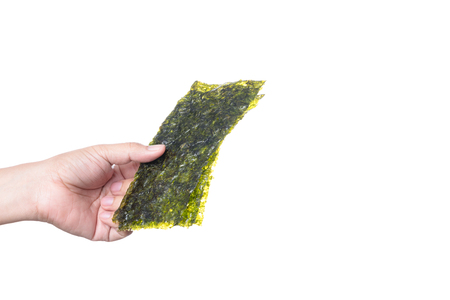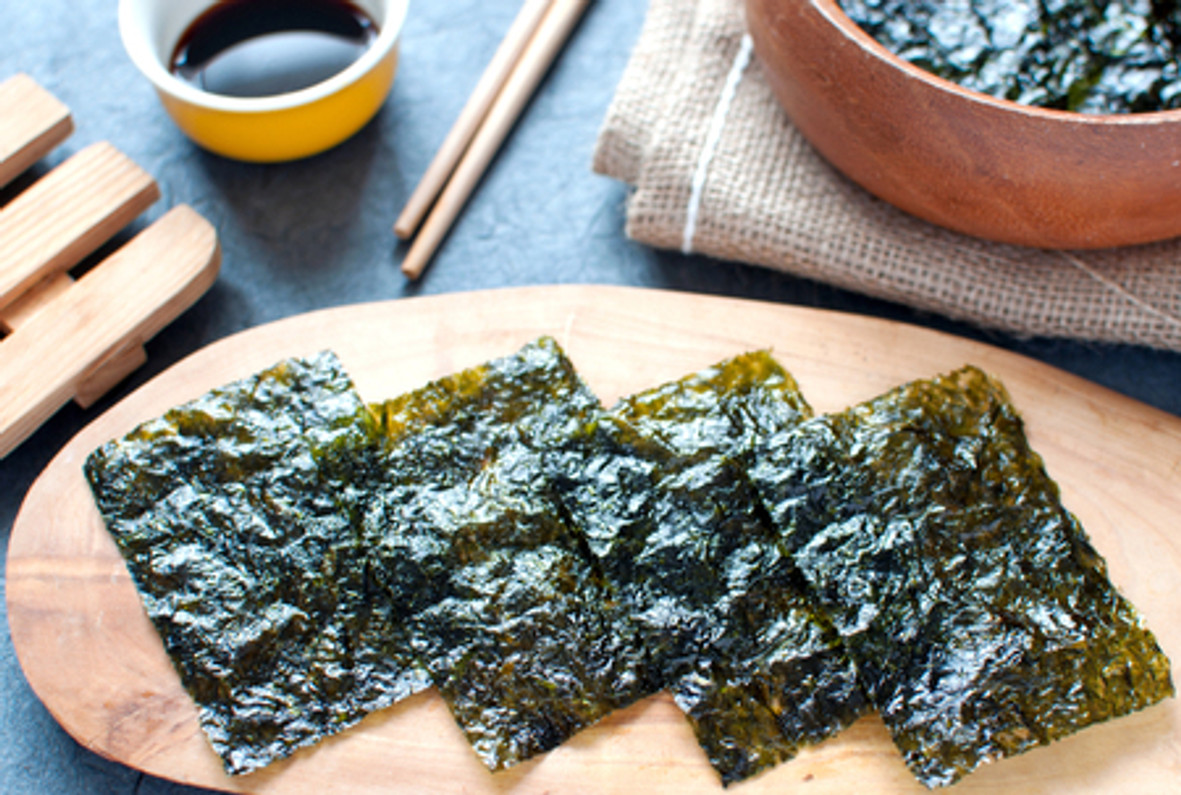Superfood Seaweed Benefits (and Reasons to Starting Eat It)
Seaweed may not look or sound like the most appetizing food—but if you aren’t currently eating this exotic sea vegetable, you’re missing out on some great superfood benefits.
Seaweed is part of the algae family. There are three main types of common edible algae:
- Brown, the most common, including kelp, arame, kombu and wakame
- Green, including chlorella
- Red, including nori
There are a few main ways to buy and consume seaweed. You can eat it as a whole food seaweed snack, in seaweed sheets for sushi or other recipes, or take it as a supplement in capsule or powder form.
However you consume take it, the following seaweed benefits make it a great health food to add to your diet.
1. Packed with Nutrients, Especially Iodine

Seaweed is a rich source of several important vitamins and minerals, including:
- Vitamins A, C, D, E, and B vitamins
- Calcium
- Potassium
- Magnesium
- Iron
- Copper
- Omega 3 essential fatty acids
But the biggest benefit of seaweed is that it’s a source of the trace element iodine.
Iodine is a nutrient necessary for a healthy thyroid, the gland in your neck responsible for hormone production and regulation.
When the thyroid isn’t healthy, it can lead to a range of symptoms.
Symptoms of iodine deficiency can vary from mild to severe and may include:
- Fatigue
- Weakness
- Trouble thinking
- Trouble losing weight
- Constipation
- High cholesterol
- Sensitivity to cold
- Heart palpitations
- Swelling of the thyroid gland (known as goiter)
Most American don’t get enough iodine from their daily diets. Normal table salt is fortified with iodine to prevent this deficiency, but if you use natural sea salt (which isn’t fortified) or eat a low-sodium diet, you might still need more iodine in your diet.
That’s where seaweed can come in as a very rich source of iodine along with other nutrients.
The amount in seaweed varies by product and species, so check with each individual option to find out how much it contains.
2. High in Fiber
Seaweed contains soluble fiber, which increases bulk and helps move food through your gut. Fiber is necessary for healthy digestion, cholesterol, and balanced blood sugar.
Fiber also helps you feel full, which supports a healthy appetite and weight. Plus, the fiber source comes from polysaccharides, carrageenans, and agar, which are prebiotics that further encourage healthy bacteria in the gut.
3. May Help Hormone Regulation
Besides being the nutrition-packed seaweed benefits, research suggests it may also help regulate the hormone estrogen, supporting sexual organ function and balanced mood [1].
In fact, some data suggests seaweed may even be the reason Japanese populations, which have a high intake of seaweed, have reduced risks of estrogen-related cancers like breast cancer [2]. If that’s the case, increasing seaweed consumption could have life-changing benefits.
4. Magnificent Antioxidant Source

Seaweed contains polyphenolic compounds, safe antioxidants that fight inflammation and damage from free radicals in the body. They’re also strongly associated with longer life expectancy and less illness [3].
The polysaccharides in seaweed, especially those in brown and red types, have also been shown to have high antioxidant activity [4].
5. Contributes Good Healthy Fats
Seaweed contains a good ratio omega 6 and omega 3 fatty acids, which the World Health Organization recommends for fighting inflammation and supporting the heart and nervous system [5].
Seaweed is also the only plant food containing EPA (eicosapentaenoic acid) and DHA (docosahexaenoic acid). These fatty acids are normally found in fish and contain more potent health benefits than ALA (alpha-linolenic acid) from nuts and other plant sources.
This makes seaweed an excellent healthy fat option for vegan, vegetarians, or anyone who eats none or very little fish.
Seaweed Cautions: How Much to Eat and When to Limit
While the seaweed benefits listed above make it an amazing food to add to your diet now, there is a caution to consider.
Seaweed is a potent source of iodine, which we need—but too much iodine can be a problem too.
The amount of iodine in seaweed varies by type, but some (but not all) seaweed snacks and products provide at least twice the RDA (Recommended Dietary Allowance) of iodine, which is 150 mcg per day. In some cases, getting too much iodine can cause symptoms similar to those of deficiency.
This is probably not a concern unless you’re consuming higher-iodine sources of seaweed everyday. But if you’re worried about too much iodine from seaweed, speak with your doctor or dietitian and always check the packages of the seaweed product you’re eating.
The bottomline is that seaweed is an amazing plant food with a variety of vitamins, minerals, and antioxidants that are keys to good health. And as long as you don’t overdo it on the iodine, it’s a fantastic addition to your regular diet.
Shop here for a variety of seaweed products to support your health journey!
Disclaimer: Statements made have not been evaluated by the FDA. Products are not intended to diagnose, treat, cure, or prevent any disease.
Recent Posts
-
Potassium Bromate: The Health Risks of This Sneaky Additive and How to Avoid It
Are you consuming a common bread additive that’s a possible human carcinogen?That additive is known …Dec 1st 2023 -
6 Huge Benefits of Meditation for Your Mind & Body
You’ve probably heard something about the benefits of meditation for your brain, body, stress levels …Nov 30th 2023 -
5 Natural Damaged Hair Treatments and Remedies for Healthy, Vibrant Hair Today
If your hair’s been exposed to products, appliances, dyes, or even toxic environment factors over th …Nov 30th 2023




